Marking a Milestone: Four Years of Daily Study Groups
Four years ago, as the COVID pandemic wreaked havoc to class and event schedules, instructors and organizations were scrambling to create meaningful learning opportunities for students. In April 2020, Stephen Wolfram challenged the Wolfram U team to establish a unique online program for building computational skills with Daily Study Groups. The program was enthusiastically received by learners of all ages, and, after recently completing our 50th Daily Study Group, this is the perfect time to reflect on the program, celebrate a milestone and look ahead to future developments.
What Are Wolfram Daily Study Groups?
The mission behind Daily Study Groups was pretty simple. They were to facilitate learning cohorts that met together online for one hour daily, Monday through Friday, for one or more weeks. They were to offer interesting, timely and fun computational topics that provided hands-on access to the latest Wolfram technology and a Study Group instructor who was knowledgeable in the field. They were to provide support to online sessions with helpful staff who assisted in polling the group to review key concepts, introducing practice problems and answering questions. Finally, the Daily Study Groups would offer certifications to those who went the extra mile and successfully completed quizzes, practice problems and exams. After running almost five hundred daily sessions for thousands of participants, we can call the program a huge success!
What Do You Study?
Our first Daily Study Group was a primer on learning Wolfram Language. The Study Groups that have proven to be the most popular are based on programming topics (such as Wolfram Language Basics, Programming Proficiency and Creating Custom User Interfaces) and college-level mathematics courses such as calculus, differential equations, linear algebra and statistics. Computational topics are also well-represented in Daily Study Groups in areas of data science, cryptography, machine learning, signal processing and game theory.
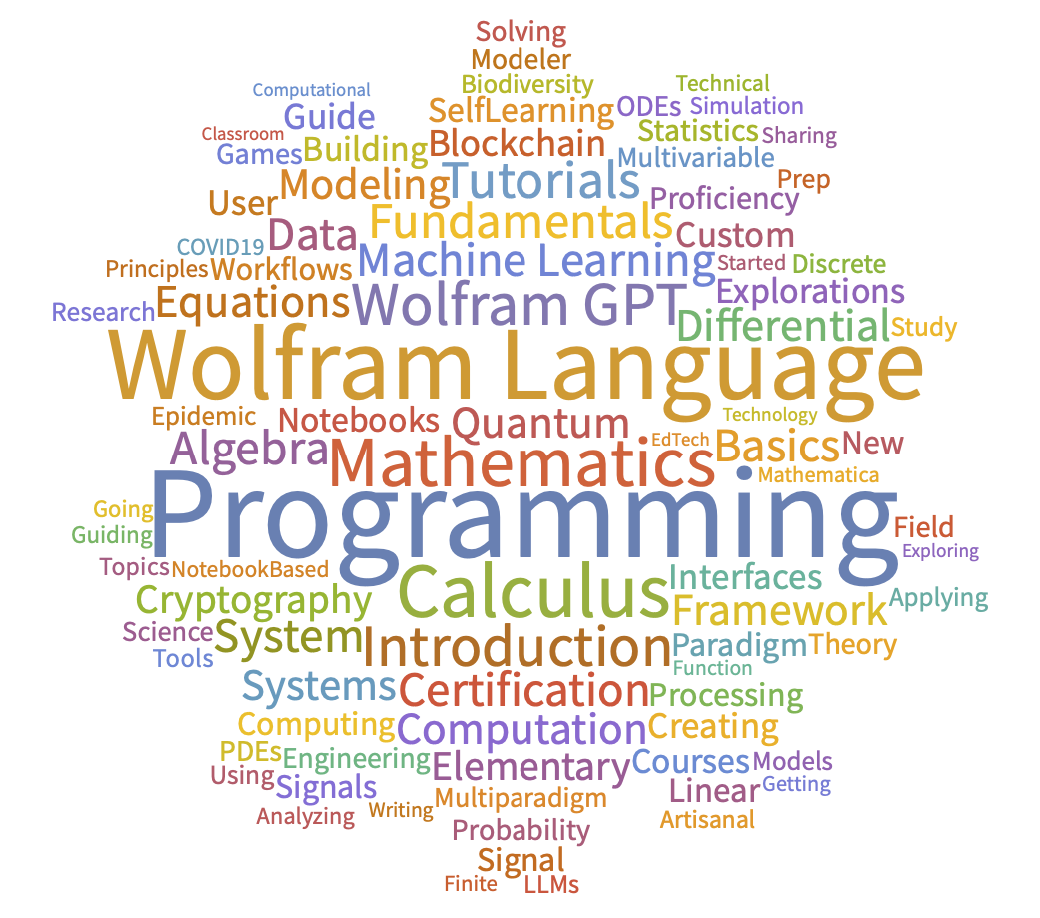
Are Trending Hot Topics Covered?
Daily Study Groups are a great way to learn more about trending topics and technology, and Wolfram users are always curious to explore the latest. During the pandemic, we hosted the Study Groups COVID-19 Data Analysis and Visualization, Biodiversity Explorations with Machine Learning and Building and Applying Epidemiological Models. Daily Study Groups have helped participants learn about cutting-edge topics like quantum computing, blockchain and Wolfram GPT; our 50th Daily Study Group was all about LLM functionality. The following poll shows the range of interest in different tools at this Study Group:
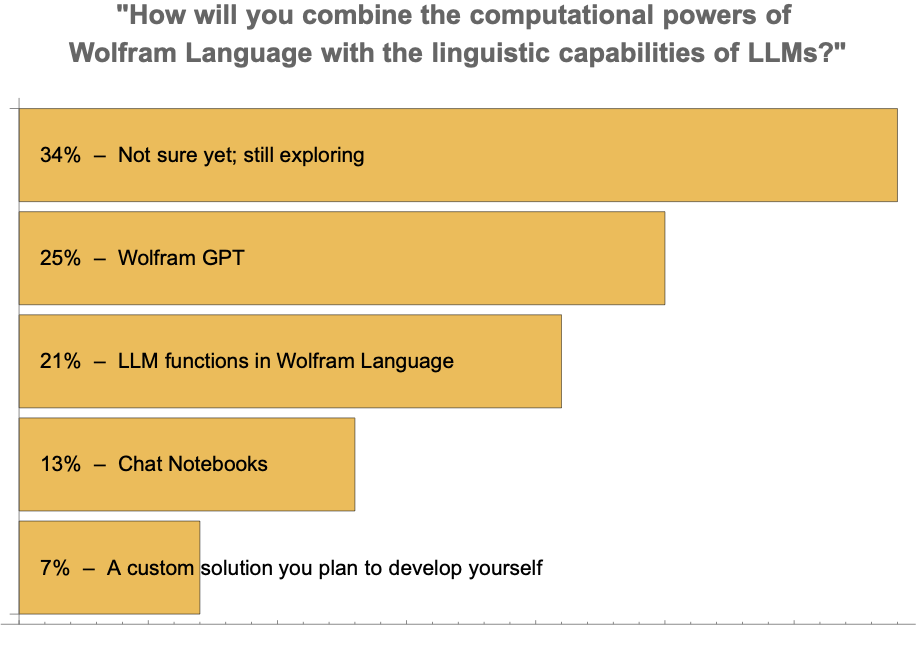
Early Access to Wolfram Interactive Courses
Joining the Daily Study Groups can also sometimes provide access to pre-released course content, giving participants a sneak peak at upcoming courses and helping us to collect valuable feedback before a full public release. Our interactive courses cover a wide range of computational topics, and we discovered that running Daily Study Groups based on these courses was a great way to further engage students and encourage them to complete coursework and earn Wolfram certifications. A recent Study Group followed this model for Introduction to Finite Mathematics. The Study Group followed lessons from the interactive course and participants were the first to have access to course quizzes and exercises and even prepare for the final exam. We’re pleased that many from the Study Group went on to pass the exam and earn a Level 1 certification for proficiency in finite mathematics.
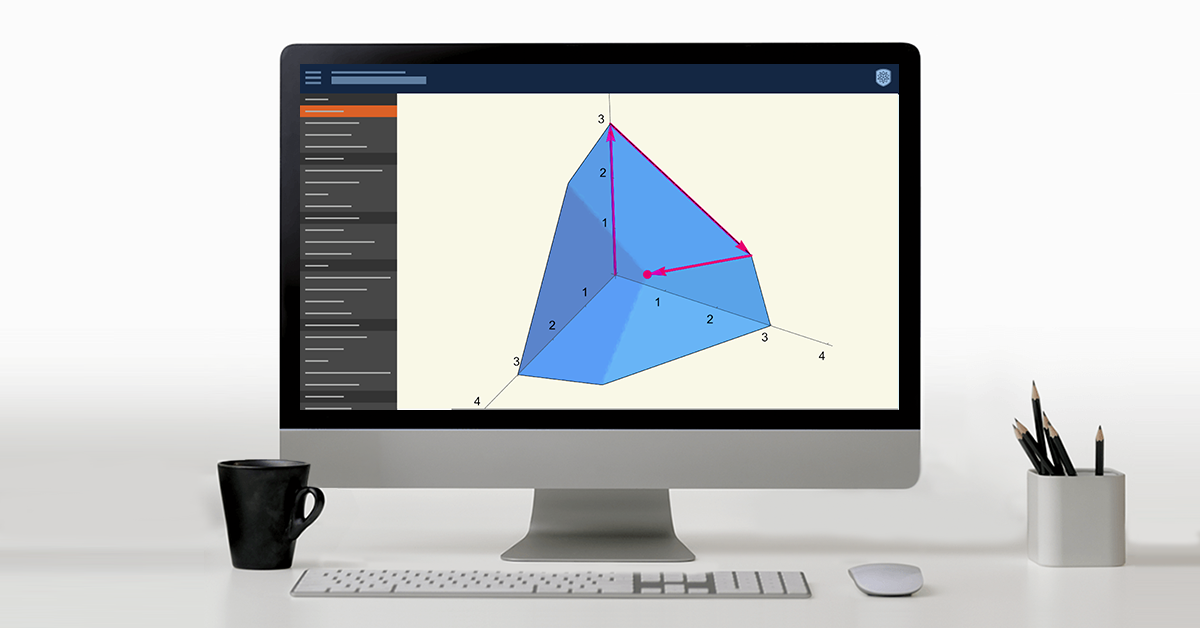
Community Engagement
Each Daily Study Group establishes a Wolfram U group discussion on Wolfram Community. Many of these discussions have grown to be incredibly active and useful to Community members. Check out the recent discussion threads, and keep in mind that you only get full access to Study Group materials, including lesson notebooks, videos, quizzes, certification opportunities and more, when you sign up for a Wolfram Daily Study Group.
Learning and Certifications
More than 2,300 Wolfram certifications have been granted through Daily Study Group programs so far, and we look forward to awarding many more. Level 2 certification for applied expertise in Wolfram Language programming is a brand-new certification level offered by Wolfram U, and we were pleased to introduce it in a Daily Study Group earlier this year. Congratulations to Michael Ulrey, who is the very first to be recognized with the Level 2 certificate for his project work with Bell’s theorem, visualizing pertinent sets of correlations. We know there are many Wolfram Language users out there with Level 2–caliber project work. I hope you’ll be ready to promote your skills and knowledge by applying for Wolfram certifications, which are easily sharable to professional profile pages and applications.
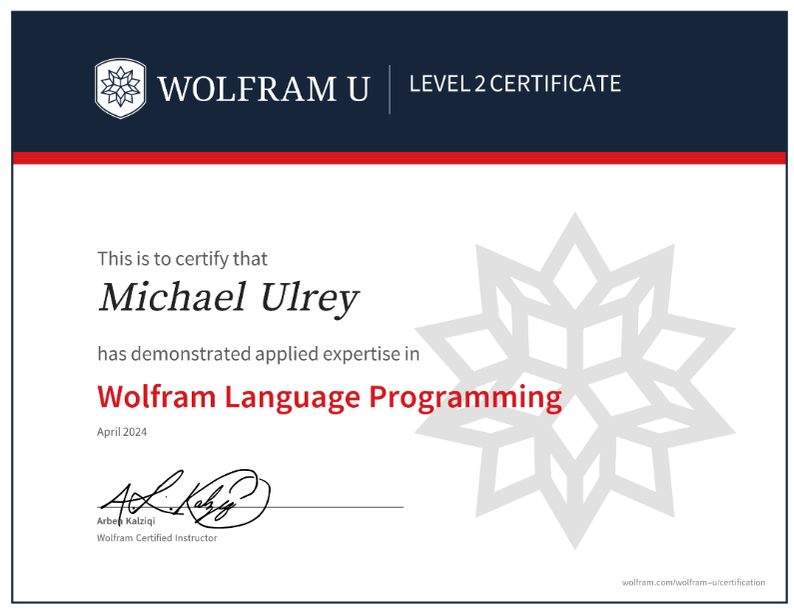
A wide variety of certifications is available. Participating in a Daily Study Group is an enjoyable way to complete coursework and earn certifications, but many certifications are obtainable through independent completion of courses at Wolfram U, allowing you to manage learning time at your own pace and schedule. I encourage you to browse the full catalog and find topics of interest to you. The following is a sample of available Wolfram certifications:
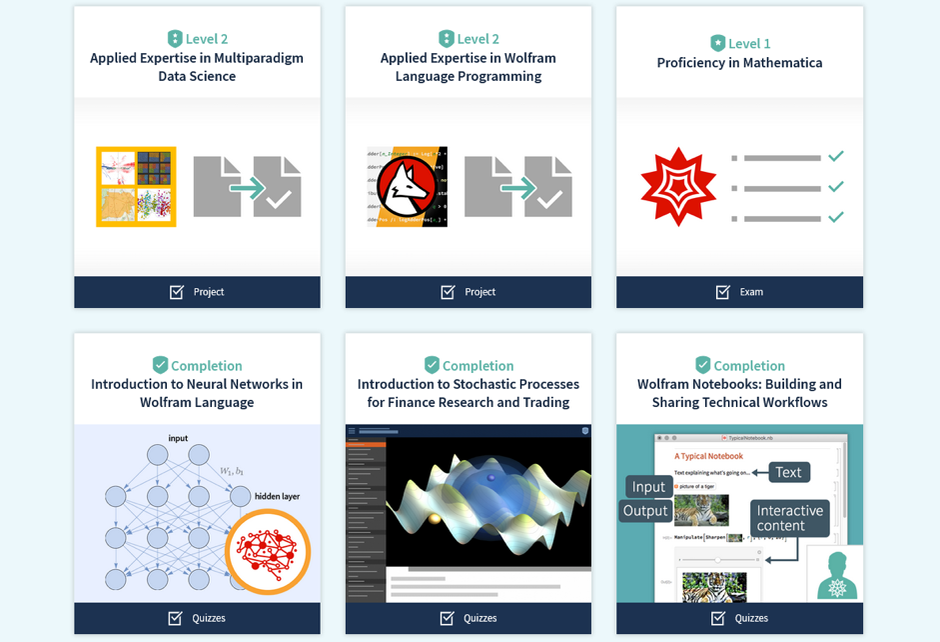
What Participants Are Saying
One of the best things about being part of a Daily Study Group is hearing how helpful they are to so many people. We read all our survey comments, and it’s a pleasure to receive this kind of feedback:
- “As someone who has teaching experience about 20+ years, these sessions provided new insights, introduced some new topics and inspired me to explore more.”
- “I am a student who has benefited greatly from your instruction since the Daily Study Group: Introduction to Multivariable Calculus. I want to express my sincere gratitude for your dedication to our education. Your willingness to answer our questions during class and carefully consider our survey responses has been invaluable.”
- “That was a wonderful study group idea… I really loved it and I hope you will have more of this kind of study group. It was clear that the presenters had spent many hours preparing their notebooks, and prior to that researching the topics… which made a wonderful opportunity for the listener to brush up on a topic, or learn a new topic, and see how it is implemented in Wolfram Language. You had me mesmerized. More, more, more… Thank you.”
What’s Next?
More courses, more computational explorations and more learning! You can count on Wolfram U and Daily Study Groups to keep up with expanding technologies and the latest content from Wolfram. Watch for upcoming Study Groups in complex analysis, electric circuits, computational physics, machine learning, generative AI and, of course, opportunities for getting started and building skills with Wolfram Language. Consult our current Study Group schedule any time to see the latest.
Thanks to a Fantastic Team
At Wolfram, we’re fortunate to be surrounded by colleagues with specialized fields of interests and experience in academia and teaching. I want to take this opportunity to thank all the Study Group instructors, teaching assistants and Wolfram U staff who have helped to provide such a rich resource to so many over the past four years. Running a daily online program is a big task and requires much coordination and teamwork. Thanks also to the folks from all sorts of backgrounds, from all around the world, who have participated in Daily Study Groups. The secret to the success of Wolfram Daily Study Groups comes down to a combination of talented instructors and staff, reliable technology, motivated students and the power of Wolfram Language.
| Check out Wolfram U for a wealth of free interactive courses, video courses and special events. |
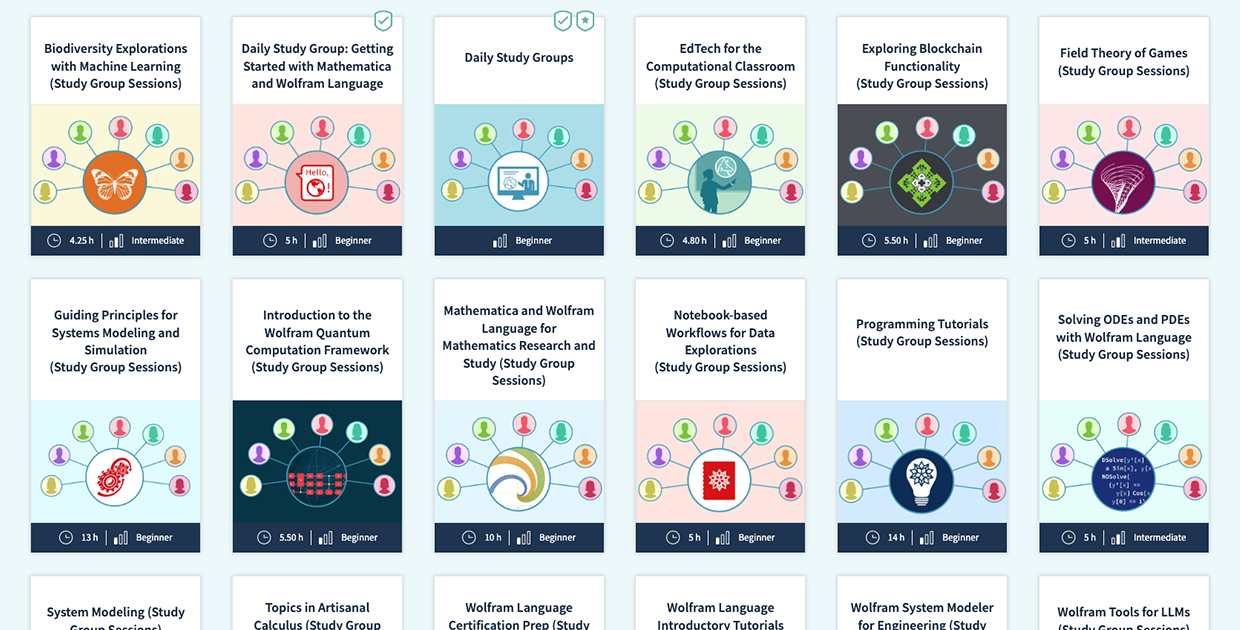



The “Daily Study Groups” schedule mentioned in the article…
https://www.wolfram.com/wolfram-u/courses/wolfram-language/daily-study-groups/
Doesn’t seem to be accessible from the “Wolfram U” page…
https://www.wolfram.com/wolfram-u/
Hi Stephen,
You can find our Daily Study Group schedule on the Wolfram U homepage ( https://www.wolfram.com/wolfram-u ) by scrolling down to “Other Learning Resources” on the bottom right and clicking “Wolfram Daily Study Groups”. You can also find Daily Study Groups by going to our course catalog and searching for keywords “Daily Study Group” — https://www.wolfram.com/wolfram-u/courses/catalog/?q=Daily+Study+Group&f_button=filters . This search will list the Daily Study Groups overview page as well as individual Study Groups. Thanks for reading!
— The Wolfram Blog Team